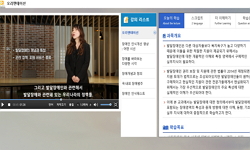This study examines the school adaptation and everyday experiences of women possessing mild intellectual disabilities who were taught in an inclusive educational environment. The study aims to identify alternative methods of improving the quality of l...
http://chineseinput.net/에서 pinyin(병음)방식으로 중국어를 변환할 수 있습니다.
변환된 중국어를 복사하여 사용하시면 됩니다.
- 中文 을 입력하시려면 zhongwen을 입력하시고 space를누르시면됩니다.
- 北京 을 입력하시려면 beijing을 입력하시고 space를 누르시면 됩니다.

경도 지적장애 여성들은 어떻게 학교에 다녔을까?: 경도 지적장애 여성들의 학교생활 경험 탐색 = The Educational Experiences of Women with Mild Intellectual Disabilities
한글로보기https://www.riss.kr/link?id=A108911201
- 저자
- 발행기관
- 학술지명
- 권호사항
-
발행연도
2023
-
작성언어
-
- 주제어
-
KDC
300
-
등재정보
KCI등재
-
자료형태
학술저널
-
수록면
27-55(29쪽)
- 제공처
-
0
상세조회 -
0
다운로드
부가정보
다국어 초록 (Multilingual Abstract)
This study examines the school adaptation and everyday experiences of women possessing mild intellectual disabilities who were taught in an inclusive educational environment. The study aims to identify alternative methods of improving the quality of life for women with mild intellectual disabilities during their school and everyday routines. In-depth interviews were conducted with three women who had mild intellectual disabilities during their early adulthood. They received their education in an inclusive educational environment. The research questions were: How did the women with mild intellectual disabilities experience school life as ‘mild,’ ‘intellectual,’ and ‘girls’ in an integrated education environment? What practical support measures can improve the quality of school and daily life for women with mild intellectual disabilities? Two formal interviews were conducted with each participant, and the resulting data underwent qualitative content analysis. After analyzing the data, we identified eight sub-themes that fall under four core themes: 1) School day memories, 2) Identity as a young woman with an intellectual disability, 3) Adolescence, and 4) Support requirements. Our analysis revealed the realities of school life and social adaptation for girls with mild intellectual disabilities and discussed methods for addressing their support needs.
동일학술지(권/호) 다른 논문
-
발달장애 성인 형제자매의 돌봄에 대한 인식과 지원 요구
- 한국지적장애교육학회
- 신혜원 ( Shin Hye Won )
- 2023
- KCI등재
-
그림책을 활용한 갈등해결 프로그램이 지적장애 초등학생의 갈등인식과 갈등해결전략 및 자기조절능력에 미치는 영향
- 한국지적장애교육학회
- 강희진 ( Kang Hui Jin )
- 2023
- KCI등재
-
두뇌기반 정서지능 향상 프로그램이 경계선 지적기능 학생의 뇌파와 정서지능에 미치는 영향
- 한국지적장애교육학회
- 민천식 ( Min Chun Sik )
- 2023
- KCI등재
-
특수교육대상학생을 위한 방학프로그램 운영에 관한 특수교사의 인식 및 지원 요구
- 한국지적장애교육학회
- 박상희 ( Park Sang Hee )
- 2023
- KCI등재




 KCI
KCI KISS
KISS




